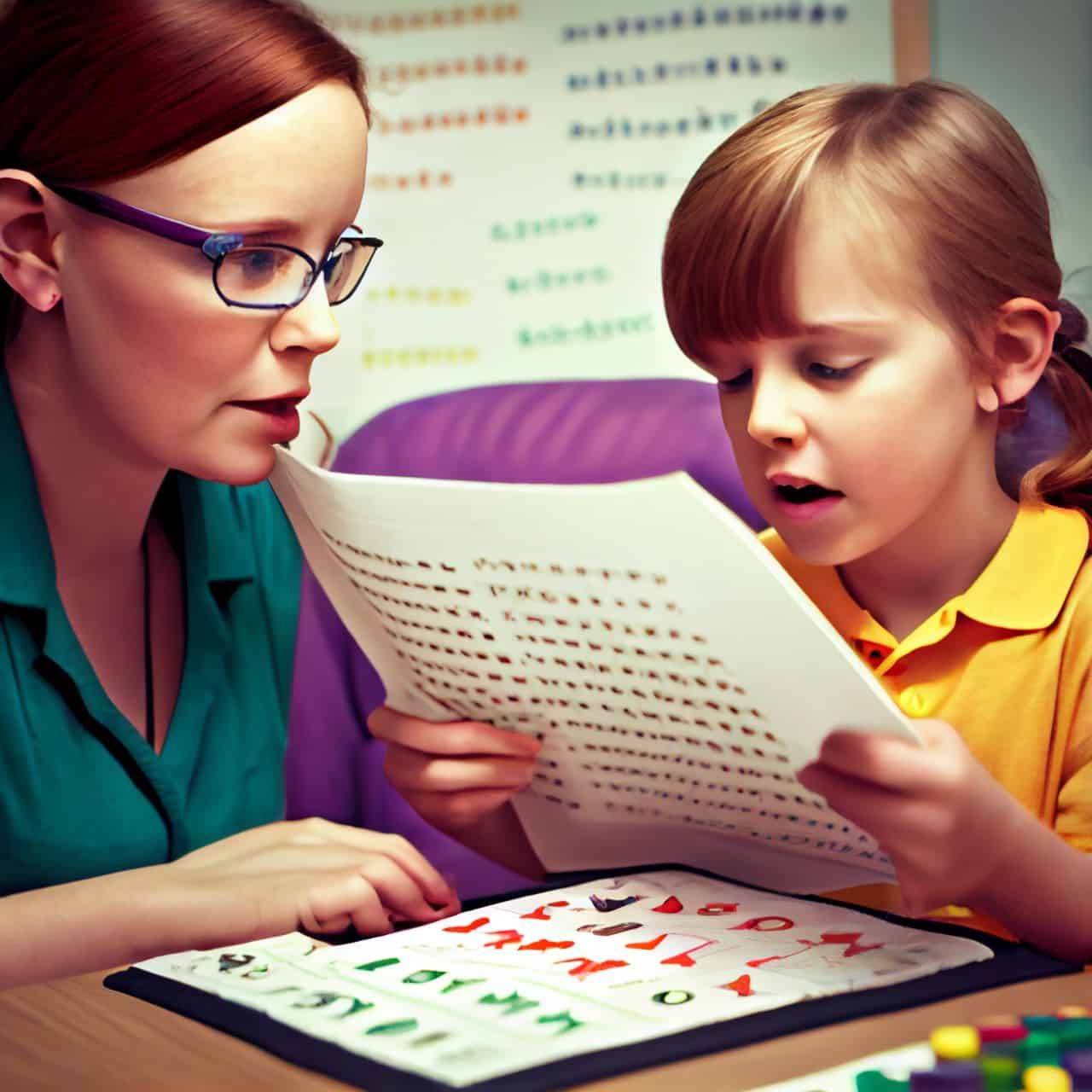As a mother, nothing is more important than ensuring your child’s well-being and development. However, when it comes to speech and language disorders, many parents feel helpless and unsure of how to help their child.
This is where mommy speech therapy comes in- a specialized approach that focuses on improving communication skills in young children. In this blog post, I will explore what mommy speech therapy is all about, common speech and language disorders in children, signs indicating that your child may need therapy, and the benefits of seeking help from a qualified therapist. So let’s dive into the world of speech therapy together!
Table of Contents
What Is Mommy Speech Therapy, And How Does It Work?
Mommy Speech Therapy is an innovative approach to speech therapy that uses various techniques and strategies to help children improve their speech, language, communication skills, and cognitive development.
Definition Of Mommy Speech Therapy
As a mother, I understand the importance of early speech and language development in children. Mommy Speech Therapy is a specialized form of speech therapy that focuses on helping young children improve their communication skills. It involves techniques and strategies that can be implemented at home by parents to enhance their child’s language development.

The goal of Mommy Speech Therapy is to help children overcome common speech and language disorders such as articulation, language, fluency, and voice disorders. A qualified therapist will work with both the child and parent to develop personalized treatment plans that incorporate play-based activities, exercises, and other fun learning methods.
One of the most essential aspects of Mommy Speech Therapy is parental involvement. As the primary caregiver for your child, you have a crucial role in enhancing their communication skills. By working closely with your therapist, you can gain valuable insights into ways to support your little one’s journey toward improved speech and language abilities – something that can make all the difference in your child’s future success!
Importance Of Early Speech And Language Development In Children
As a mother, I understand the importance of early speech and language development in children. In fact, research shows that the first five years of a child’s life are critical for speech and language skills to develop properly. That’s why it’s important to start addressing any potential issues as soon as possible.
Early intervention through Mommy Speech Therapy can make all the difference in your child’s communication skills, helping them succeed academically and socially. Plus, getting an early diagnosis allows you to start treatment before any difficulties become more serious or ingrained.
Don’t hesitate to seek assistance from a qualified speech therapist if you feel your child may be struggling with their communication skills. With early intervention and consistent practice using effective techniques like those offered by Mommy Speech Therapy, your child can thrive both academically and personally.
Techniques And Strategies Used In Therapy
As a mother of a child with speech difficulties, it’s important to understand the various techniques and strategies used in mommy speech therapy. The first step is assessing your child’s individual needs through an articulation screener or evaluation by a qualified speech therapist. From there, the therapist will create personalized goals and exercises for your child that focus on areas such as phonetics, communication skills, and articulation.
During therapy sessions, you can expect to see activities like tongue thrust correction, oral motor exercises for orofacial myofunctional disorders, and even games that target auditory processing disorders. Additionally, some therapists may use technology like apps or recordings to supplement traditional therapy methods. As a parent involved in the process, you’ll be coached on how to support your child outside of therapy sessions with at-home exercises and practice opportunities.
Overall, Mommy Speech Therapy takes a comprehensive approach that addresses both physical components like tongue placement as well as cognitive components like language development. By utilizing these evidence-based techniques and strategies alongside parental involvement and support from qualified professionals, children can make significant progress in their speech abilities over time.
Importance Of Parental Involvement
As a mother, you play an important role in your child’s speech therapy journey. Parental involvement is crucial to the success of therapy sessions. It allows you to understand your child’s progress and communicate with their therapist about any concerns or questions you may have.

Your active participation during therapy sessions can also help reinforce techniques and strategies used by the therapist at home. This creates a consistent approach to addressing your child’s speech and language development needs.
Additionally, parental involvement promotes positive reinforcement and motivation for your child. Praising their efforts during practice exercises can go a long way in boosting their confidence levels as they strive to reach their speech goals.
In conclusion, don’t underestimate the impact that your involvement has on your child’s learning and development journey. By partnering with their speech therapist, you can create a supportive environment that fosters growth, self-esteem, and successful communication outcomes for your little one.
Common Speech And Language Disorders In Children
Children may experience speech and language disorders such as articulation, language, fluency, and voice disorders, but don’t worry – in the next section; we will help you recognize signs your child may need speech therapy. Keep reading to learn more about how Mommy Speech Therapy can be beneficial for your child’s learning and development.
Articulation Disorders
As mothers, we all want our little ones to communicate effectively and with confidence. However, articulation disorders can cause difficulties for children when it comes to clear speech and pronunciation. These disorders affect the sounds children make while speaking, such as substituting one sound for another or omitting certain sounds altogether.
Articulation problems typically arise during early childhood development stages and may persist if left unaddressed. They can lead to social anxiety, academic struggles, and self-esteem issues later in life. This is why seeking help from a qualified speech therapist through mommy speech therapy services is essential.
The good news is that parents can also play a vital role in their child’s therapy by practicing exercises at home that reinforce correct tongue placement and jaw movements. By working together with your child’s speech therapist through mommy speech therapy techniques, you’re ensuring that your child has the best chance of overcoming articulation disorders and developing strong communication skills for life.
Language Disorders
As a mother of a child with speech problems, it’s important to understand the different types of language disorders that can affect your child’s development. Expressive language disorder is one type that impacts a child’s ability to communicate their thoughts and ideas effectively through spoken or written language. Receptive language disorder, on the other hand, affects the understanding and comprehension of spoken or written words.
If your child has been diagnosed with a language disorder, early intervention through Mommy Speech Therapy can help them overcome these challenges. Techniques used in therapy may include repetition and modeling of correct grammar and sentence structure, as well as visual aids to aid in comprehension. With consistent therapy sessions and active parental involvement, children can make significant progress in improving their communication skills.
Fluency Disorders
Fluency disorders can affect a child’s ability to speak smoothly and with ease. This disorder includes stuttering, the repetition of sounds, words, or phrases; prolongation, extending a sound for longer than normal; and blocks, where the child cannot produce any sound at all. As a mother myself, I understand how frustrating and disheartening it can be when your child experiences difficulty expressing themselves. However, with help from Mommy Speech Therapy techniques and strategies tailored to their needs by a qualified speech therapist, your child can improve their fluency.
During speech therapy sessions for fluency disorders, one technique used is called slow speech. This involves reducing the speed of talking, which helps children who tend to speak too quickly or rush through their sentences leading to disfluencies like stuttering. Another strategy is providing positive feedback when children display fluent speech patterns during conversation as they encourage them not to feel embarrassed or frustrated about speaking. Consistent practice of these methods at home and school under the guidance of an experienced therapist increases chances of improved fluency in no time!
Voice Disorders
As a mother of a child with speech problems, it’s important to be aware of various voice disorders that can affect their communication skills. Voice disorders are characterized by changes in pitch, volume, or quality of sound produced during speech. Some common types include vocal nodules, vocal polyps, and spasmodic dysphonia.
Vocal nodules and polyps are caused by excessive strain on the vocal cords, usually from yelling or singing too loudly for an extended period leading to growths that cause hoarseness, roughness, or breathiness in the voice. On the other hand, spasmodic dysphonia is a neurological condition that causes involuntary movements in the vocal cords resulting in unpredictable voice breaks.
It’s crucial to diagnose and treat these conditions early as they can lead to greater problems, such as chronic hoarseness or even loss of voice if left untreated. Speech therapy techniques that focus on improving breathing techniques and reducing tension around the neck and shoulders may help children overcome these challenges for more effective communication skills.
Signs Your Child May Need Speech Therapy
If your child is experiencing delayed speech and language milestones, difficulty with articulation and pronunciation, or trouble understanding or following directions, it may be a sign that they need speech therapy.

Delayed Speech And Language Milestones
As mothers, we are always eager to see our children reach new milestones. However, when it comes to speech and language development, some children may experience delays. It’s important for us as parents to pay attention to these milestones and seek help if necessary.
One common delayed milestone is the age at which a child begins speaking their first words. According to the American Speech Language Hearing Association (ASHA), most children say their first word around 12 months of age. If your child has not said any words by their 16th month, it may be time to consider seeking the advice of a speech-language pathologist.
Another milestone is sentence formation or combining two words together by age 2. By this age, most children should have an expressive vocabulary of about 50 words or more. If you notice that your child struggles with forming sentences or expressing themselves through language beyond this point, it could be worth consulting with a speech therapist who can perform an assessment and provide appropriate therapy techniques.
Remember that every child develops at their own pace, and there is no need for alarm if they don’t reach certain milestones exactly on schedule. However, recognizing these potential delays and seeking help early can make all the difference in helping our little ones develop strong communication skills for life.
Difficulty With Articulation And Pronunciation
As a mother, you may notice that your child is struggling with pronouncing certain sounds or words. This can be frustrating for both you and your child. Articulation disorders are common in children and can impact their speech development if left untreated.
Some signs of difficulty with articulation and pronunciation include substituting one sound for another, leaving out certain sounds in words, or using the wrong tongue placement when making a specific sound.
When working with a mommy speech therapist, they will assess your child’s articulation skills and create a treatment plan tailored to their needs. Through activities such as games and targeted exercises, your child will learn proper tongue placement and practice saying sounds correct. With consistent therapy sessions and parental involvement at home, improvement in articulation skills can be seen over time.
Trouble Understanding Or Following Directions
As a mother, it can be concerning if your child struggles with understanding or following directions. This can sometimes be a sign of a language disorder that requires speech therapy intervention. Children who struggle with these skills may have difficulty in school and social situations.
The good news is that Mommy Speech Therapy provides techniques to help children improve their receptive language skills. These techniques include teaching your child to pay attention, encouraging them to ask for clarification when they don’t understand, breaking down instructions into simpler steps, and using visual aids.
By working together with a qualified speech therapist, you can help your child develop the necessary language skills to comprehend and follow instructions effectively. Early intervention is key, so don’t hesitate to seek professional help if you notice any signs of trouble understanding or following directions in your child’s development.
Benefits Of Mommy Speech Therapy For Children
Mommy Speech Therapy can provide numerous benefits for children, including improved speech and language skills, enhanced cognitive development, increased confidence and self-esteem, and a strengthened parent-child relationship.
Improved Speech And Language Skills
As a mother of a child with speech problems, I know firsthand the importance of seeking help from a qualified speech therapist. One of the most significant benefits of mommy speech therapy is that it can improve your child’s speech and language skills.
Through various techniques such as phonetics and articulation exercises, your child will be able to learn how to correctly pronounce words and communicate more effectively. As they progress in their therapy sessions, you may notice an improvement in their vocabulary and sentence structure.
Furthermore, improved communication skills can benefit your child both now and in the future. Being able to express themselves clearly can lead to increased self-confidence and socialization skills that are essential for success throughout their lives. So if you’ve noticed any signs that suggest your child could benefit from speech therapy, don’t hesitate to reach out for help!
Enhanced Cognitive Development
As a mother of a child with speech problems, you are probably wondering about the long-term effects on your child’s development. One benefit of Mommy Speech Therapy is that it can enhance cognitive development in children. By improving language skills, children are better able to process information and understand new concepts.
Research has shown that early speech and language intervention can lead to improved memory, attention, problem-solving skills, and academic performance. Activities used in therapy, such as storytelling, reading books aloud, and playing games, also stimulate brain development.
In addition to improving cognitive ability, Mommy Speech Therapy can help your child become more confident in their abilities. As they make progress in therapy sessions, they will feel proud of themselves and want to continue learning. This positive mindset can have a ripple effect on other areas of their life, such as schoolwork or social situations.
Overall, enhancing cognitive development through Mommy Speech Therapy is an important step toward ensuring your child’s long-term success. With the right techniques and strategies from trained professionals and parental involvement at home, your child will be well-equipped for future challenges both academically and personally.
Increased Confidence And Self-Esteem
As a mother, it’s painful to see your child struggle with communication. Having trouble expressing themselves can lead to frustration and low self-esteem. That’s where Mommy Speech Therapy comes in. By focusing on improving communication skills, we help children gain confidence in themselves and their abilities.
One of the most rewarding parts of my job as a speech therapist is seeing the transformation in children’s personalities as they develop stronger language skills. Improved communication means they’re better able to express their thoughts and feelings, which leads to increased self-confidence. This newfound confidence can carry over into other aspects of their lives, from socializing with peers to excelling academically.
By working together through Mommy Speech Therapy sessions, they address not only specific speech or language deficits but also enhance overall self-esteem. When your child feels confident about communicating effectively, there’s no limit to what they can achieve!
Strengthened Parent-Child Relationship
As a mother of a child with speech problems, one of the most important benefits I have experienced through Mommy Speech Therapy is the strengthened relationship between my child and me. By actively participating in therapy sessions and practicing techniques at home, I have been able to develop a deeper understanding of my child’s needs and how I can best support their language development.
Additionally, speech therapy has provided an opportunity for me to spend quality one-on-one time with my child. Through games and activities designed to improve speech and language skills, we’ve created a special bond that extends beyond just working on their communication abilities.
Overall, Mommy Speech Therapy has improved not only my child’s speech but also our relationship as parent and child. It has helped us communicate better, understand each other more deeply, and enjoy each other’s company even more.
How To Seek Help From A Speech Therapist
If you suspect that your child needs speech therapy, it’s important to seek help from a qualified speech therapist as soon as possible. In this section, we’ll discuss the benefits of early intervention and provide tips on finding the right professional for your child’s specific needs. Don’t miss out on this critical information that could make all the difference in your child’s learning and development journey!
Importance Of Early Intervention
As a mother of a child with speech problems, I understand the crucial role early intervention plays in enhancing their language skills. It is important to seek help from a qualified speech therapist as soon as you notice any signs of developmental delays or difficulties with articulation and pronunciation. The earlier your child receives therapy, the better their chances for success.
Through early intervention, therapists can identify and address any underlying issues that may be hindering your child’s communication skills. This can include techniques such as play-based therapy, visual aids, and repetition exercises to improve phonetics and language development. As parents, we have an important role to play in supporting our children’s learning journey by participating actively in the therapy sessions at home.
In conclusion, don’t hesitate to seek help if you suspect that your child has speech problems. Early speech and language interventions can significantly enhance their ability to communicate effectively with others and ultimately set them up for success both academically and socially throughout life.
Finding A Qualified Speech Therapist
When it comes to finding a qualified speech therapist for your child, there are a few important things to consider. First and foremost, you want someone who has the appropriate education and training in speech-language pathology. Look for a licensed or certified professional with experience working specifically with children.
It’s also important to find someone who makes your child feel comfortable and at ease during therapy sessions. You can ask for recommendations from your pediatrician or other parents whose children have received speech therapy.
During your initial consultation with a potential therapist, be sure to ask about their treatment approach and what kinds of techniques they use. And remember that early intervention is key – the sooner you seek help for your child’s speech issues, the more effective therapy is likely to be.
What To Expect During A Speech Therapy Session
When you take your child to a speech therapy session, you can expect a warm and welcoming environment where both you and your child will feel comfortable. The session usually lasts between 30 to 45 minutes, depending on your child’s attention span and therapy goals. During the first few sessions, the speech-language pathologist (SLP) will evaluate your child’s communication skills through various assessments.
The SLP will then create an individualized treatment plan based on your child’s needs and goals. Depending on the type of disorder, they may use different techniques such as articulation drills, phonetics exercises, or language games to help improve their communication skills. You’ll also be given recommendations for activities that can be done at home to reinforce what is learned during the therapy session.
It’s important to note that building trust with your therapist takes time, so it’s normal if things don’t go smoothly in the beginning but don’t worry; keep attending sessions consistently with patience and open communication with the therapist who would ultimately ensure progress in your child’s speech development journey. Through consistent therapy sessions coupled with parent involvement and guidance by professionals, parents are giving their children an edge in life.
Conclusion
In conclusion, mommy speech therapy can be a game-changer for your child’s learning and development. Early intervention is key, and with the right techniques and strategies used in therapy and parental involvement, children can overcome common speech and language disorders such as articulation, fluency, and voice disorders, among others.
Don’t hesitate to seek help from qualified speech therapists who use various exercises to enhance cognitive development, improve communication skills, and boost the confidence levels of children, which leads to stronger Parent-Child relationships.
Remember that every child deserves a chance to communicate effectively with the world around them. So take action today! Contact an experienced speech therapist in your area and start your child on their journey toward better communication skills.
Frequently Asked Questions
What is mommy speech therapy, and how does it help children with their learning and development?
Mommy speech therapy involves parents working with a licensed speech therapist to learn strategies for promoting language development in their child at home. This can include activities such as reading books, playing games, and incorporating language into daily routines like meal times. By practicing these techniques consistently, children can improve their communication skills and overall learning abilities.
What are some common signs that a child may benefit from mommy speech therapy?
Children who struggle with speaking clearly or expressing themselves effectively may benefit from mommy speech therapy. Other signs to look out for include difficulty following directions, trouble understanding words or concepts, limited vocabulary, and poor social interaction.
How often should a parent engage in mommy speech therapy sessions with their child?
The frequency of mommy speech therapy sessions can vary depending on the needs of the individual child and family schedule constraints. However, therapists typically recommend consistent practice multiple times per week for optimal results.
Can older children also benefit from mommy speech therapy?
Yes! While commonly associated with young children who are still developing their language skills, older children who continue to face challenges expressing themselves or communicating effectively can also benefit from the supportive environment provided by mom-lead sessions that emphasize consistency in action planning between theory/strategy implementation methodologies provided by trained professionals alongside parental involvement whether they are directly participating through role-playing exercises or simply providing a listening ear for feedback during progressive stages of evaluation & treatment management phases directed towards improving progress observed over time via scientifically-backed research methods proven successful in other instances where patients have faced similar issues requiring attention (e.g., neurological considerations).

